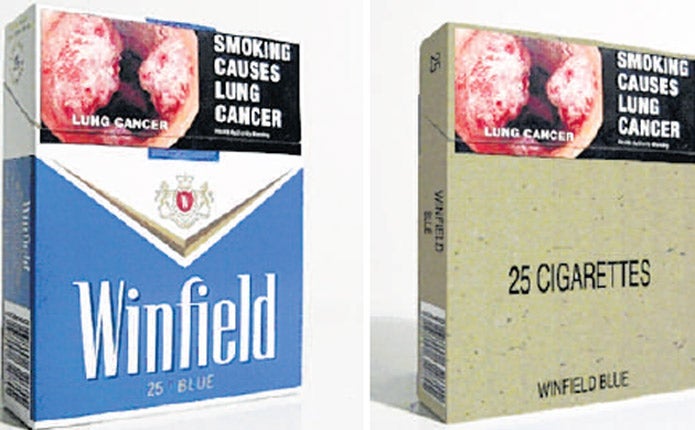Australia to ban logos on cigarette packets

Australia is poised to introduce the world's harshest anti-smoking laws, with tobacco companies forced to sell cigarettes in plain packets resembling prescription drug packs.
The move, expected to be announced today by the Health Minister, Nicola Roxon, will strip packets of all logos, colourful imagery and promotional text, which have been shown to reduce the effectiveness of health warnings. Only the brand name will appear, in a generic font, along with the government health warning.
The legislation, due to take effect from 2012, is intended to make cigarettes less appealing, particularly to young people, and to cut the number of smoking-related deaths. However, it is bitterly opposed by the tobacco industry, which has vowed to challenge it in the courts.
British American Tobacco, which controls 42 per cent of the A$8.3bn (£5bn) Australian market, told The Sydney Morning Herald it would "take every action necessary to protect ... its right to compete as a legitimate commercial business selling a legal product".
The World Health Organisation (WHO) has recommended a move to plain packaging, a call echoed last year by the Australian government's Preventative Health Taskforce. The idea has also been seriously mooted in Britain, Canada and New Zealand. But until now governments have hesitated to act, fearing they might contravene international laws on free trade and intellectual property rights.
In Australia, a free-market think-tank, the Institute of Public Affairs, warned this week that forcing companies to remove their trademarks from products was equivalent to compulsorily acquiring property. It said that, under the Australian constitution, the government would be obliged to pay the industry A$3.4bn in compensation.
But Jonathan Liberman, senior legal policy adviser to the International Union Against Cancer, told ABC radio: "We're really confident Australia wouldn't be in breach of any international legal obligations." He added, in a reference to the WHO's Framework Convention on Tobacco Control: "On the contrary, we would see this as Australia showing international leadership in implementing obligations under international law."
Australia has long been at the forefront of the war on tobacco. In some states, smoking has been illegal in indoor public places since 1999, and since 2004 cigarettes have been banned from popular Sydney beaches including Bondi. Cigarette packets feature graphic health warnings that include images of diseased lungs and gangrenous limbs.
Smoking-related illnesses kill more than 15,000 Australians every year, and smoking has been identified as the largest preventable cause of death and disease. Tough restrictions on tobacco advertising have reduced the proportion of smokers from 30.5 per cent of over-14s in 1988 to 16.6 per cent in 2007.
The Labor government wants to cut smoking rates to below 10 per cent by 2018. It reportedly plans to test a variety of plain packets in order to identify the least appealing design.
Clearly rattled, the tobacco giant Philip Morris has set up a website outlining alleged problems associated with plain packaging and claiming that the move will not reduce smoking.
George Williams, one of Australia's leading constitutional law experts, said he doubted that the tobacco companies would succeed in a legal challenge. "Prior High Court authority suggests they would see this as regulating the use of intellectual property ... [not] acquiring that intellectual property," he said.
Join our commenting forum
Join thought-provoking conversations, follow other Independent readers and see their replies
Comments
Bookmark popover
Removed from bookmarks